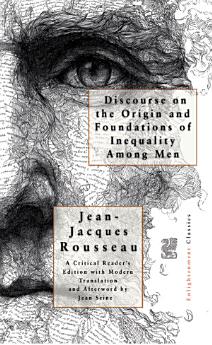Discourse on the Origin and Foundations of Inequality among Men
About this ebook
This modern critical reader's translation from the original French manuscripts includes supplementary materials that bring Rousseau's world and impact to life. This professional translation delivers scholarly depth with amplifying materials. This Reader's Edition includes an illuminating afterword tracing Rousseau's intellectual relationship with Diderot, Voltaire and his reception by Nietzsche, revealing the fascinating dialogue between the period's most influential minds. A comprehensive timeline connects the major events of Rousseau's life with world events, an glossary of Enlightenment terminology frames Rousseau's debates in the intellectual milieu of his day, and a detailed index provides an authoritative guide to his complete writings.
In 1754, prompted by another question from the Academy of Dijon, Rousseau set out to trace the origins of inequality among people and to ask if social hierarchy was authorized by natural law. He spent months crafting a sweeping historical narrative of humanity—from solitary, egalitarian “savages” in an idyllic state of nature to the emergence of agriculture, private property, government, and the injustices of civilized life. Published in 1755 and often called the "Second Discourse", the work deepened Rousseau’s radical critique of modern society, fueling Enlightenment debates over human nature, private property, and the legitimacy of social inequality.
First printed in 1755, the Discourse on the Origin and Foundations of Inequality Among Men confronted readers with a sweeping reconstruction of early human history and the rise of social injustice. Rousseau opens this essay by conjuring a hypothetical “state of nature” in which human beings roamed the earth free, solitary, and naturally equal—uncorrupted by the vices that accompany society. In this natural Eden, people knew neither luxury nor oppression; they possessed an innate pity and a simple self-love that kept aggression in check. The narrative then shows how everything changed when humans began to form communities: the emergence of agriculture, metallurgy, and above all the claiming of private property set the stage for competition, exploitation, and the loss of innocence. Rousseau famously suggests that the first person to fence off a plot of land and call it “mine” created civil society—and with it the enduring conflicts and inequalities that plague humanity.
Though Rousseau did not win the Dijon contest this time, his Discourse on Inequality quickly became a touchstone of Enlightenment social thought. Readers were struck by its daring claim that inequality is not a natural condition but a human-made tragedy born of society’s wrong turns—an idea that challenged prevailing theories of thinkers like Hobbes and Locke. The essay’s stark conclusion, that the institution of private property ignited humanity’s moral downfall, resonated for decades to come and even inspired later revolutionaries and social reformers. By exposing the artificial foundations of rank and wealth, Rousseau’s Second Discourse paved the way for his later exploration of political legitimacy in The Social Contract, standing as a pivotal step toward modern egalitarian philosophy.










